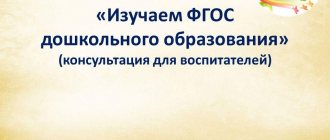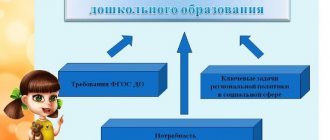Formation of professional competencies of preschool teachers
Modern standard for a preschool teacher
Requirements from educational standards for a preschool teacher include knowledge of the specifics of preschool education, willingness to plan and adjust tasks, participation in creating a psychologically comfortable environment, proficiency in digital technologies and other components.
In general, the professional competencies of a teacher imply active psychological, communicative and research activities. The popular educational course “Paths” is aimed at preparing a child for school through creativity. But for this form of work, the teacher himself needs to be able to solve his professional problems with the help of creativity. In recent years, much has been said about unlocking a child’s potential, but it is also important to think about the teacher’s internal resources, his professional and personal development.
Salutogenic factors that positively influence the formation of pedagogical competencies:
- High level of intelligence and creativity.
- Communication skills, willingness to cooperate.
- Formation of special interests and hobbies.
- Positive self-confidence.
- Increased locus of control.
The basis of pedagogical acmeology - the science of continuous professional improvement of a teacher - is the principle of mutual learning. You can improve your professional skills in the form of tutor support.
ABC for preschoolers. We play and read together. 5-7 years.
Training using three textbooks in the set (“Playing with sounds and words” - notebooks No. 1, 2, “Playing and reading together”) creates in children an interest in further learning their native language, strong reading and literate writing skills. The purpose of the “Let's Play and Read Together” guide is to lay the foundations of reading and writing skills. In the manual, children get acquainted with the letters denoting the consonant sounds zh, sh, shch, x, ts, ch, letters soft sign, hard sign. A different application contains cards with letters for all consonant sounds.
Buy
Tutoring
A tutor is a teacher who ensures the development of individual programs and accompanies the process of their implementation. Tutoring is useful not only when working with students, but also within the teaching staff.
Model of tutor action in a preschool educational institution
1. Crystallization stage
Action:
Creating a "Redundant Environment" selection environment.
Mechanism:
Auction, fair of ideas.
Result:
Formation of orders, formation of individual and modular groups in the main shortage area.
2. Design stage.
Action:
Navigation.
Mechanism:
Tutorat (coach meeting).
Result:
Adjusting the order, forming expectations for events, developing an interaction strategy (targeted support).
3. Implementation stage.
Action:
Implementation of an individual plan.
Support modules:
Workshops, laboratories, coaching sessions.
Result:
Studying cases, technological maps and didactic materials, mastering pedagogical technologies, developing professional thinking.
4. Analytical stage.
Action:
Tutor tests “Choice environment”.
Mechanisms:
Open day, fair of ideas.
Result:
Writing essays, compiling cases.
Thus, in mutual assistance “teacher to teacher,” the level of proficiency in social methods and techniques of the deficit direction increases.
We speak correctly. We talk and write. Benefit for children 6-8 years old
The proposed manual will help the child learn: • determine the semantic (logical) sequence of the plot; • build coherent statements based on pictures; • use a rich imagination; • interact with adults and peers. The manual is intended for individual work with children aged 6–8 years, both in a preschool educational organization and in the family.
Buy
Coaching
Coaching is a technology aimed at unlocking an individual's potential. The competencies of a teacher and a coaching specialist largely coincide. A modern educator acts not just as a consultant, but as a professional inspirer, giving advice on finding and solving educational problems. Coaching techniques also suggest ways to develop a teacher’s professional competence.
Consider the “Balance Wheel”
, successfully implemented in work with novice educators:
- At the first coaching meeting with a young specialist, we draw a circle divided into equal parts. Each of them represents possible problem areas: growth prospects, teamwork, planning, mastery of pedagogical techniques, self-analysis, job responsibilities, age and characteristics of children. The teacher ranks each problem from 1 to 10 in different colors on the “wheel”. This allows you to clearly see what causes the main difficulties in his work.
- Let's draw up the first 3 steps to strengthen the weakest sector. We assign a tutor.
- The tutor sets 3 simple, clear tasks with a limited deadline for the young teacher.
- At the next meeting with the tutor, the teacher turns in completed assignments and draws a new “Balance Wheel” to mark his progress.
Results:
- Understanding the situation.
- Understanding what could have been better.
- Understanding how to do better.
- Thus, with the help of technologies, borrowed, among other things, from business and marketing, it is possible to increase professionalism and develop the competencies of educators.
Professional competence of a teacher
The professional competence of a teacher is a necessary condition for improving the quality of the pedagogical process.
The professional activities of preschool teachers are multifaceted and require certain knowledge, abilities, skills and qualities. In modern pedagogical literature, this knowledge, abilities, skills and qualities are united by such a concept as “professional competence”. Based on the analysis of various definitions of this concept, taking into account the characteristics of the teacher’s activities, the following option can be synthesized: the professional competence of a preschool teacher is the ability to effectively perform professional activities determined by the requirements of the position, based on fundamental scientific education and an emotional and value-based attitude to teaching activities. It presupposes possession of professionally significant attitudes and personal qualities, theoretical knowledge, professional skills.
The new social order addressed to continuous pedagogical education is expressed in the form of requirements for the qualifications of teachers capable of independent development in innovation in the field of education of preschool children.
For the high-quality formation of a teacher’s competence, basic knowledge, skills, and abilities are required, which will be improved in the process of self-education.
The teacher must be competent in the organization and content of activities in the following areas:
– educational and educational;
– educational and methodological;
– social and pedagogical.
Educational activities presuppose the following criteria of competence: implementation of a holistic pedagogical process; creation of a development environment; ensuring the protection of children's life and health. These criteria are supported by the following indicators of teacher competence: knowledge of the goals, objectives, content, principles, forms, methods and means of teaching and educating preschoolers; the ability to effectively develop knowledge, skills and abilities in accordance with the educational program; ability to manage the main activities of preschoolers; ability to interact with preschoolers.
The teaching and methodological activities of a teacher presuppose the following competence criteria: planning educational work; designing teaching activities based on analysis of achieved results. These criteria are supported by the following indicators of competence: knowledge of the educational program and methods of developing various types of children’s activities; the ability to design, plan and implement a holistic pedagogical process; mastery of technologies for research, pedagogical monitoring, education and training of children.
The socio-pedagogical activity of a teacher presupposes the following competence criteria: advisory assistance to parents; creating conditions for the socialization of children; protection of children's interests and rights. These criteria are supported by the following indicators:
Knowledge of basic documents about the rights of the child and the responsibilities of adults towards children; ability to conduct explanatory pedagogical work with parents and pre-school specialists.
In our preschool educational institution, when opening 3 new groups, we were faced with the fact that the teachers who went to work with a pedagogical education did not have work experience or it was insufficient. For this purpose, the School of Young Specialists was organized, the purpose of which is to help novice teachers improve their professional competence. At the first stage, we carried out diagnostics of young specialists and determined the level of professional competence of educators.
The purpose of the diagnosis: how well the teacher is theoretically prepared, whether he has experience in practical work with children, what results he wants to achieve in his professional activities, whether he wants to continue his education. The diagnostic results showed that teachers have insufficient knowledge in the field of age characteristics of preschool children; difficulties in communication; The focus of most teachers on the educational and disciplinary model of interaction with children, a low level of information skills was noted. We tried to solve these difficulties.
At the second stage, various forms of professional development were used: these are traditional methods such as consultations, lectures and discussions, round tables, the work of creative micro groups, various competitions, as well as systematic training sessions with an emphasis on professionally significant qualities and skills. To develop communicative competence, training sessions were conducted aimed at acquiring communicative experience “The most difficult parent. The most pleasant parent”, “Talk to me”, “When soul speaks to soul”, etc. During the classes, various techniques were used: solving pedagogical situations, a method of simulating a teacher’s working day, “brainstorming”, etc. Seminars and workshops were held : “Age characteristics of preschool children”, “Secrets of good discipline”, etc.
The purpose of such classes was the unity of theoretical and practical readiness to carry out pedagogical activities, which characterizes the professionalism of the teacher.
The results of the “Young Specialist School” are as follows:
a) acquisition by participants of knowledge and skills in the field of self-diagnosis: development of reflection as self-analysis;
b) acquisition of skills and abilities of effective communication;
c) the emergence of teachers’ motivation for self-improvement and acquisition of deeper knowledge.
Such active forms and methods of the School of Young Specialists are already producing results. Work in this direction will continue because The professional competence of a teacher must be improved to the level of professional excellence, and this is a necessary condition for improving the quality of education.
Professional competence of a teacher as a factor in improving the quality of preschool education.
The problem of the quality of preschool education is very relevant in modern conditions of reforming the educational system. Interest in this issue reflects society's attempts to rebuild the system of transferring the vast experience of human knowledge to the younger generation. At the same time, significant attention is paid to the content of quality.
When determining the conditions that ensure the quality of preschool education, it is necessary to highlight the most important of them:
use of health-saving technologies that will allow organizing the educational process in such a way that the child can develop without excessive physical and mental stress that undermines health;
high level of quality of educational programs and their methodological support, the content of which will allow teachers to build the educational process in accordance with modern requirements and levels of development of society;
enrichment of the subject-development environment, the content of which will provide the child with the opportunity for self-development;
a high level of competence of the teacher, whose main function is to help the child adapt to life in the world around him, developing such significant abilities as the ability to understand the world, act in the world, and display attitudes towards the world.
All of the above positions are priorities in ensuring the quality of preschool education. At the same time, in our opinion, the implementation of each condition is impossible without the participation of a competent teacher who ensures the organization of the successful development of the child in a preschool educational institution.
Analysis of existing approaches to determining the professional competence of a preschool teacher (A.M. Borodich, R.S. Bure, A.I. Vasilyeva, E.A. Grebenshchikova, M.I. Lisina, V.S. Mukhina, E.A. Panko, V.A. Petrovsky, L.V. Pozdnyak, L.G. Semushina, V.I. Yadeshko, etc.) made it possible to identify several qualities that a modern teacher should have:
desire for personal development and creativity;
motivation and readiness for innovation;
understanding of modern priorities of preschool education;
ability and need for reflection.
S.M. Godnik professional competence means a set of professional knowledge and skills, as well as methods of performing professional activities. At the same time, he emphasizes that the professional competence of a specialist is determined not only by the scientific knowledge acquired during education, but also by value orientations, motives of activity, understanding of oneself in the world and the world around, style of relationship with people, general culture, and the ability to develop creative potential [2] .
The professional competence of a preschool teacher is defined by us as the level of his knowledge and professionalism, which allows him to make the right decisions in each specific situation when organizing the pedagogical process in a preschool educational institution. The competency component in the structure of a specialist’s preparedness is defined as a set of professionally, socially and personally significant educational results in the language of competences. Therefore, in order to successfully support the educational process in a preschool educational institution, it is necessary to highlight the components of a teacher’s professional competence, namely:
organizational and methodological;
educational;
scientific research.
The organizational and methodological component of the competence of a preschool teacher lies in the variability of the content of the educational process, the selection of technologies, the regulation of the teacher’s activities in the system, and is also aimed at resolving contradictions that arise in the process of interaction with children, colleagues, parents, administration, to ensure their cooperation and achievement joint goals in the development, education and socialization of preschool children.
The educational component of competence presupposes the teacher's mastery of didactic theory, a system of professional knowledge, abilities, skills, and social experience. Theoretical and practical aspects of educational competence ensure mastery of the content, organizational and methodological foundations of upbringing, teaching children during preschool childhood, as well as the spiritual and personal development of a child in a preschool educational institution. The implementation of educational activities involves an effective and creative approach to creating conditions for the harmonious development and education of a preschooler.
The scientific research component of competence orients the teacher in the diverse flow of psychological, pedagogical and methodological information and is the basis for improving his further activities.
The modern system of professional education requires teachers to possess the reflective component of competence, which is associated not only with understanding their own pedagogical activities, but also with the assessment of the personal qualities of the “reflector” by other teachers and managers. The effectiveness of the implementation of this component is associated with the teacher’s presence of such qualities as critical thinking, desire and analysis, validity and evidence of his position, and readiness to adequately perceive information.
Thus, all structural components of professional competence are aimed at the practical activities of a preschool teacher in the form of skills to resolve specific pedagogical situations. The professional readiness of a teacher, that is, his general ability to mobilize existing knowledge, experience, personal and social qualities and values that are acquired in the process of educational activities and constitute his professional competence, and, therefore, are a fundamental factor in improving the quality of preschool education.
References
1. Volkova G.V.
Increasing the level of professional competence of the teaching staff. // Head teacher, 1999, No. 7.
2.
Godnik S.M.
Formation of professional competence of a teacher: Textbook / S.M. Godnik, G.A. Kozberg. – Voronezh, 2004.
3. Zeer E., Symanyuk E.
Competence-based approach to the modernization of vocational education // Higher education in Russia. – 2005. – No. 4.
4. Competence-based approach in teacher education: Collective monograph / Ed. prof. V.A. Kozyreva and prof. N.F. Radionova. – St. Petersburg: Publishing house of the Russian State Pedagogical University named after. A.I. Herzen, 2004.
5. Lebedev O.E.
Competency-based approach in education. https://www.nekrasovspb/ru/publikation/
6. Potashnik M.M.
Education quality management. M., 2000.
7. Semushina L.G.
Study of the professional functions of a teacher: Abstract of the dissertation of candidate of pedagogical sciences. – M., 1979.




